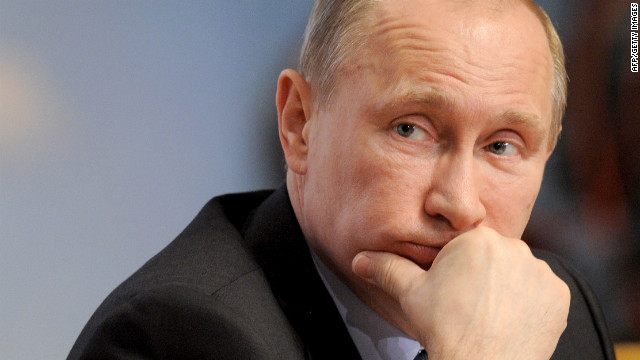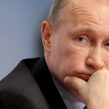
The Kremlin Grows Nervous About the Future—and With Good Reason
Publication: Eurasia Daily Monitor Volume: 12 Issue: 98
By:

It is still difficult to figure out what sorts of conclusions President Vladimir Putin drew from the long meeting he held with US Secretary of State John Kerry two weeks ago (May 12), in Sochi (see EDM, May 19). But the recent behavior of top Russian officials betrays much apparent anxiety and even nervousness about the future in the halls of power in Moscow. Last week, the Russian government had implemented a concerted effort aimed at discrediting the European Union’s May 21–22 Eastern Partnership (EaP) summit in Riga; and there was much speculation about Armenia’s and Belarus’s objections to the words “annexation of Crimea” in the joint end-of-summit statement (RBC.ru, May 22). German Chancellor Angela Merkel evidently saw no need to reiterate her point on defining that breach of international law as “criminal,” and some clever wording was invented. In turn, the Russian Ministry of Foreign Affairs felt obliged to decry that the EU “mumbled yet again its inadequate position on Crimea” (Kommersant, May 23). In fact, Europe tries hard to demonstrate that the EaP has nothing to do with “spheres of influence” and exhibits no anti-Russian character (Carnegie.ru, May 21).
It is not surprising that the Kremlin still seeks to derail this EU enterprise, but the fake indignation coming out of Moscow against a “smear campaign” in the Western media targeting Putin personally is rather surprising (Vedomosti, May 22). The issue in question is the publication of new evidence on shamelessly corrupt business deals in St. Petersburg in the mid-1990s, in which Putin was evidently enthusiastically involved (Newsru.com, May 23). What could make this unsurprising news damaging to Putin’s inflated approval ratings is the fact that his subordinates, who 20 years ago were pocketing envelopes with a few thousand dollars inside, are presently involved in corruption on a mega-million-dollar scale—and nothing is being done to curb their appetites (Moscow Echo, May 22). Their nervousness about exposure to personalized sanctions is accentuated by the gradual but inescapable progress of the execution of last year’s ruling of the Hague arbitration court on the Yukos case (Kyiv Post, July 29, 2014). Courts in the US, France and the United Kingdom may now begin taking measures ensuring that the compensation amounting to over $50 billion is indeed paid by Russia to shareholders (Gazeta.ru, May 22).
The vast scale of corruption within Putin’s close circle of oligarchs is a major factor in the deepening of Russia’s economic crisis, which the government is desperately trying to talk out of existence (Ezhednevny Zhurnal, May 22). Official statistics are professionally doctored to support a positive perspective, but there is no denying the fact that, in April, the economy registered a sharp 4-percent contraction despite relatively stable oil prices (RBC.ru, May 22). Gazprom, headed by long-time Putin associate Alexei Miller, is performing particularly poorly and has lost so much of its business clout and reputation that Norway has surpassed Russia as the top gas exporter to Europe (Newsru.com, May 22). The under-performance of Russia’s energy sector goes hand in hand with the escalation of demands from the military-industrial complex, which proudly demonstrated its new models during the Red Square parade. Defense expenditures, planned at the very high level of 4.5 percent of GDP, have now jumped in the first quarter to a staggering mark of 9 percent (Forbes.ru, May 18). Meanwhile, the steady decline of real incomes is not seen by Russians as a short-term misfortune; nearly 70 percent of respondents in various polls expect a further deterioration (Nezavisimaya Gazeta, May 21).
No amount of militaristic propaganda can overcome such everyday concerns about jobs and inflation. And what makes the Kremlin’s “patriotic” mobilization ineffectual is the increasingly obvious inability to justify the Russian intervention in eastern Ukraine. This duplicity was exposed last week when a squad of Russian special forces (Spetsnaz) crossed the ceasefire line and was caught in a crossfire, leaving two soldiers wounded (including the commanding officer, Captain Yevgeny Yerofeyev) and captured by Ukrainian forces (Gazeta.ru, May 19). Russia’s Ministry of Defense issued a denial, insisting that Yerofeyev and Sergeant Alexander Alexandrov had earlier resigned from active service. But both men confirmed their combat deployment to eastern Ukraine with their 220-strong Spetsnaz battalion from the 3rd Special Forces Brigade, based in Tolyatti, Samara oblast (Novaya Gazeta, May 22). This official betrayal of its soldiers performing their duty is a typical feature of the Russian “hybrid war” against Ukraine, but it makes it hard to maintain the war’s popularity with public opinion and demoralizes the battalions deployed in the war zone (Slon.ru, May 21).
The strategic aims of Russia’s war against Ukraine are, indeed, entirely unclear. And while the Kremlin swears to its commitment to the Minsk ceasefire agreements, its propaganda keeps waging a viciously aggressive campaign. What is clear is the massive humanitarian crisis in the “Rump Novorossiya,” aggravated by violent clashes between feuding war bands. Last Friday, Aleksei Mozgovoi, the commander of the Prizrak (Phantom) Brigade, was killed; his name can now be crossed off the US’s and the EU’s sanctions lists (RBC.ru, May 23). The Kremlin’s political convenience of waging a small war and denying responsibility for the damage it inflicts on the “brotherly” Ukraine comes into conflict with the economic costs of the stalemate as well as with the Russian military’s urge to score a decisive victory (Grani.ru, May 22). The three-month pause in hostilities has yielded Russia few tangible dividends and is increasingly turning into a losing proposition.
It is this looming need to make a decision for which only bad options are available that makes the Kremlin so nervous and prone to overreacting to minor irritants like the awkward facts about Putin’s past or the capture of Russian soldiers in Ukraine. Putin has no more grand celebrations on schedule to distract the public mood from the deteriorating social services. At the same time, increasing pressure on the liberal opposition and non-governmental organizations (NGO) is unlikely to check the brewing discontent. The West seeks to avoid any escalation of tensions, so Kerry’s long conversation with Putin and the carefully worded deliberations at the EU Eastern Partnership summit were intended to calm Moscow—but they may end up being remembered as failed exercises in containment. Domestic drivers matter far more than diplomatic dances, and Putin presently feels no less pressure to prevent a political meltdown than he did in early 2014, before committing himself to the irreversible Crimean calamity.




